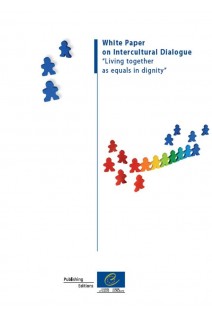



Managing Europe's increasing cultural diversity - rooted in the history of our continent and enhanced by globalisation - in a democratic manner has become a priority in recent years. The White Paper on Intercultural Dialogue - "Living together as equals in dignity", responds to an increasing demand to clarify how intercultural dialogue can enhance diversity while sustaining social cohesion.The White Paper emphatically argues in the name of the governments of the 47 member states of the Council of Europe that our common future depends on our ability to safeguard and develop human rights, as enshrined in the European Convention on Human Rights, democracy and the rule of law, and to promote mutual understanding and respect. It concludes that the intercultural approach offers a forward-looking model for the management of cultural diversity.
Foreword
Preface
1. Introduction
1.1. The Council of Europe and intercultural dialogue
1.2. The White Paper process
1.3. The major concerns
1.4. Key terms
2. Embracing cultural diversity
2.1. Pluralism, tolerance and intercultural dialogue
2.2. Equality of human dignity
2.3. Standards and tools: the achievements of the Council of Europe over five decades
2.4. The risks of non-dialogue
3. Conceptual framework
3.1. The notion of intercultural dialogue
3.2. Identity-building in a multicultural environment
3.3. Prior approaches to cultural diversity
3.4. The conditions of intercultural dialogue
3.4.1. Human rights, democracy and the rule of law
3.4.2. Equal dignity and mutual respect
3.4.3. Gender equality
3.4.4. Combating the barriers that prevent intercultural dialogue
3.5. The religious dimension
4. Five policy approaches to the promotion of intercultural dialogue
4.1. Democratic governance of cultural diversity
4.1.1. A political culture valuing diversity
4.1.2. Human rights and fundamental freedoms
4.1.3. From equality of opportunity to equal enjoyment of rights
4.2. Democratic citizenship and participation
4.3. Learning and teaching intercultural competences
4.3.1. Key competence areas: democratic citizenship, language, history
4.3.2. Primary and secondary education
4.3.3. Higher education and research
4.3.4. Non-formal and informal learning
4.3.5. The role of educators
4.3.6. The family environment
4.4. Spaces for intercultural dialogue
4.5. Intercultural dialogue in international relations
5. Recommendations and policy orientations for future action: the shared responsibility of the core actors
5.1. Democratic governance of cultural diversity
5.2. Democratic citizenship and participation
5.3. Learning and teaching intercultural competences
5.4. Spaces for intercultural dialogue
5.5. Intercultural dialogue in international relations
6. The way ahead
Appendix - Selected conventions, declarations, recommen¬dations and other reference texts of the Council of Europe relevant to intercultural dialogue
Télécharger un extrait (1000)

Managing Europe's increasing cultural diversity - rooted in the history of our continent and enhanced by globalisation - in a democratic manner has become a priority in recent years. The White Paper on Intercultural Dialogue - "Living together as equals in dignity", responds to an increasing demand to clarify how intercultural dialogue can enhance diversity while sustaining social cohesion.The White Paper emphatically argues in the name of the governments of the 47 member states of the Council of Europe that our common future depends on our ability to safeguard and develop human rights, as enshrined in the European Convention on Human Rights, democracy and the rule of law, and to promote mutual understanding and respect. It concludes that the intercultural approach offers a forward-looking model for the management of cultural diversity.
Attention, en vertu de nos conditions générales de vente, l'achat des PDF/epub est réservé aux particuliers.
